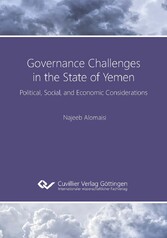Suchen und Finden
Service

Governance Challenges in the State of Yemen - Political, Social, and Economic Considerations
Najeeb H. Alomaisi
Verlag Cuvillier Verlag, 2023
ISBN 9783736967182 , 240 Seiten
Format PDF
Kopierschutz Wasserzeichen
Geräte
Mehr zum Inhalt

Governance Challenges in the State of Yemen - Political, Social, and Economic Considerations
The concept of governance has gained greater attention from scholars and international organizations as a foundation for growth, particularly to lift developing countries from dire situations and bring more prosperity to the developed world. However, according to the World Bank, Yemen is considered one of the most poorly governed countries in the world. This poor evaluation motivated this study into the challenges to good governance in Yemen and the author’s desire to demonstrate the importance of governance in addressing Yemen’s current critical situation. Despite the extensive literature published on governance, works on Yemen are rare, and there is barely any academic work on governance challenges. This relatively small body of literature encouraged me to examine in depth the obstacles to governance in Yemen. This study builds a theoretical framework to examine the difficulties of establishing good governance in Yemen by exploring the critical social and institutional challenges vital for good governance. This dissertation poses the following question: What are the challenges to good governance in Yemen, and why and how do they hamper good governance in Yemen? To address this research question, I adopted a qualitative interpretive approach. This analysis is based on information gathered from a variety of sources, including mainly semi-structured formal and informal interviews, observations, governance and government materials, such as international reports, governance manuals, websites, social media posts, and related videos, among others. The findings expose nine dimensions and 21 constructed themes, which scrutinize how and why governance is hampered in Yemen. Overall, this study introduces numbers of contributions to the governance literature by identifying social and institutional challenges and showing how they influence good governance and state-building in the Yemen context. More specifically, this Ph.D. contributes to identifying and discussing the issues that have been ignored in governance literature, such as religion, tribes, supremacy, and the Qat phenomenon, all of which applying the case of Yemen. Finally, the study makes some recommendations for stakeholders to consider, particularly for post-conflict time to aid in post-war reconstruction. This moment is an opportunity to build a state by addressing the current governance challenges, and some suggestions include a transitional phase, the introduction of constitutional and legal reforms, with youth and local community engagement.
Shop

